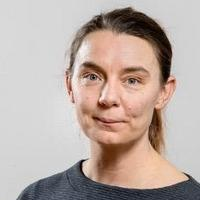
Maria Sangiuliano, PhD in Cognitive and Learning Studies, senior gender expert and researcher
- Her research and work is located at the intersection between social and technological innovation, making policies and processes more sustainable and inclusive through diversity-sensitive co-design and participatory design methods.
- Maria was in charge of supporting the H2020 EQUAL-IST partners in achieving institutional change for gender equality and led the Smart Venice team in the GE Academy consortium and other projects, such as the NEXUS project on inclusive Gender Equality Plans.

Marzia Cescon, EU Project Manager and Researcher at Smart Venice since 2018
- She was previously Junior EU Project Officer at the Veneto Regional Administration for three years and she has contributed to a wide array of EU-funded projects, mainly focused on SMEs and sustainable development.
- She holds a master’s degree in business administration as well as a Master Diploma in Global economics and social affairs from Ca’ Foscari University in Venice in partnership with the International Labour Organization, where she graduated with honours. In 2019 she attended a course for trainers in “Gender, Women, Peace and Security” organized by the Human Rights Center of the University of Padua in collaboration with UNESCO, and in 2024 she attended a course for trainers on “Addressing gender-based violence in academia” as part of the GenderSAFE project.
- Marzia has also worked for the European Delegation of Union of Chambers del Veneto.

Anita Mezza, Researcher and Project Manager at Smart Venice
- In the frame of the NEXUS Horizon Europe project, she developed the monitoring and evaluation methodology for innovative actions bridging inclusivity gaps in research organizations.
- Before joining Smart Venice, Anita worked at the European Institute for Gender Equality (EIGE), conducting statistical analysis with a focus on intersectional inequalities for the Gender Equality Index.
- Anita holds a master’s degree in educational sciences from the University of Helsinki.

Sara Clavero, Research Fellow at the EDI Directorate at TU Dublin, and Deputy Director of the AIB Research Centre on Inclusive and Equitable Cultures (RINCE)
- She holds a doctorate in Political Science from Queens University Belfast (UK) and specialises in gender equality in EU politics and policy, with a particular interest in the R&I systems of the European Research Area.
- With over 24 years of professional experience as a researcher within the disciplines of Philosophy, Sociology, Politics and Law, she has a strong commitment to interdisciplinarity in research and has participated in multiple EU funded projects covering these disciplines in both researcher and principal investigator roles.
- Since 2016, she has been involved in EU Coordination and Support Action projects (CSAs) focused on advancing equality and inclusiveness in academic and research institutions in Europe with a particular focus on “widening” countries. Sara is also a trainer on EDI in Research and Innovation (R&I) and holds an AURORA certificate from Advance HE on women’s leadership in HE and Research organisations.

Sofia Strid, Associate Professor in the Department of Sociology and Work Science at the University of Gothenburg, and Visiting Research Fellow at Oxford Brookes University, UK
- She is the Deputy Head of Department and Director of Research Studies at the Institution for Sociology and Work Science, University of Gothenburg. She has previously held positions in Gender Studies, Policy Studies, Political Science, Sociology and Women’s Studies in Austria, Belgium, Sweden and the UK; most recently in Sociology at Lancaster University, UK. Her research profile is international, multi-disciplinary and collaborative, with a focus on European multi-partner project and collaborations.
- She has communicated her research results via more than two hundred academic publications and one hundred and fifty conference presentations in 30 countries.

Roger A. Søraa, Professor in Science and Technology Studies (STS) at NTNU’s Center for Technology and Society
- He leads the interdisciplinary research group DigiKULT, which investigates how digital cultures shape society, and two large research projects: BIAS: Mitigating Diversity Biases in the Labour Market and Sociomaterial Transformations in Norway and East Asia (SoMaT).
- Dr. Søraa’s main research focuses on how technologies such as Artificial Intelligence and robotics impact the daily lives and work of people. He has published widely, e.g. through the books “AI for Diversity” and “Digitalization and Social Change: A Guide in Critical Thinking”, along with numerous journal publications, conference presentations, invited keynotes and science communication installations.
- Dr. Søraa has worked for the European Commission as an expert on technology, gender and diversity, as well as a reviewer for several national and transnational research funding agencies. Geographically, he works with local stakeholders across Norway, closely with the EU-research landscape in Brussels and all corners of Europe, and with collaborators and projects in the United States, Australia, Japan, South Korea and China. Dr. Søraa was in 2024 selected to be part of NTNU’s Outstanding Academic Fellows Programme. He’s also a Senior Researcher at NTNU Social Research.

Catherine Bolger, Psychologist and Clinical Supervisor for over 25 years working in both the University and Private Sector
- Her current role in TUD is the University’s Sexual Violence Prevention and Response Manager responsible for the delivery of workshops and training to both students and staff and the development and of the Sexual Violence Policy for the University.
- She has over 25 years experience working with Sexual Domestic and Gender Violence. She is also a Mediator registered with IMI.







